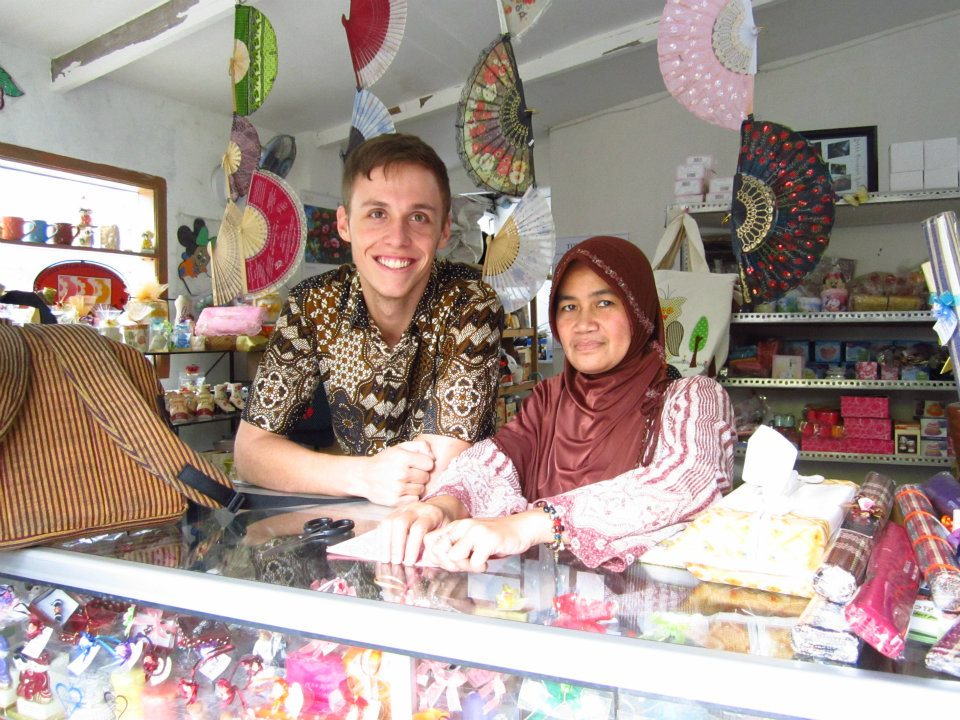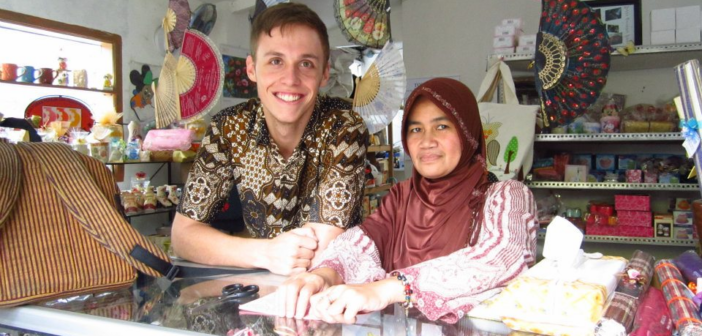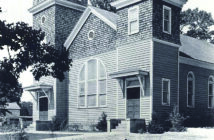
When I sat down across from Wyatt Gordon at a local Panera, he had been home from Germany for less than 36 hours after living abroad for the last 14 months.
Despite a long and exhausting journey, jet lag and having met me only once before, he greeted me like an old friend with a tight, warm hug. We found a quiet booth near the back of the restaurant, and it wasn’t long before I felt like Gordon and I had been friends for a long, long time. I quickly understood the genuine nature behind his friendly greeting. He lives by a simple philosophy: Put people first.
Gordon has traveled extensively. The list of places he’s visited or lived includes the whole of Southeast Asia, along with Kenya, Mexico, Costa Rica, the Bahamas, and all of North America and Europe.
One of his most beloved places is Moloka’i, a small Hawaiian island. During his time there, Gordon sometimes patronized a local coffee shop. On Gordon’s last day on the island, the shop owner found out that one of his friends would be on the island six hours longer than the rest of the group due to a later flight. “She closed down the shop an hour and a half early and took my friend to her family’s ancestral beach, then took her to the airport six hours later for her flight. She didn’t know this girl. I loved the prioritization of people,” Gordon said. The shopkeeper may have missed out on the last of the day’s sales, but, as Gordon said, “Life is more fun if you say, ‘You know what, I’m gonna miss out on a little bit of money, but I’m gonna have a great day.’”
His sense that relationships and people matter more than money was solidified by his experiences in Indonesia. When he visited that country, Gordon had graduated from Thomas Dale High School and was studying international relations at American University in Washington, D.C.
“Everyone in Indonesia was so much happier than the people I knew in DC. They prioritized family, friendship, human connection and spending time together. In DC, it was all about money and power and networking. People weren’t happy there compared to in Indonesia—even though in DC they earn 20 times what people in Indonesia earn. Money doesn’t matter to be happy. Everyone there is happy because of strong connections to friends or family.”
His time in Indonesia was so impactful that it changed his career path. When he returned to DC, he knew he no longer wanted to pursue his former dream of becoming a diplomat. That realization, coupled with witnessing the gentrification of the neighborhood where he lived in DC, led him in a new direction.
“The pace of change was breakneck. I saw this urban atmosphere transform around me, and it was fascinating to see things happening on a block-by-block scale,” Gordon said. “I felt in my gut I wanted to do more locally, and become an urban planner.”
Despite his extensive travel experience, Gordon feels a sense of “
He holds a graduate degree in urban and regional planning from the University of
And his world travels have given him a lot to bring home. He can speak Spanish, German and Indonesian, and has dabbled in French and Italian. He has learned about his German
“I like how Germans are so honest about confronting their history. They reflect on what that past means for their lives today and how not to repeat the past,” he said.
From his time in Hawaii, he learned to measure himself by the good he can do for the community and for nature, “not by your job title, how much money you make, where you live. The real questions are: How many people did you help this year? Who were you there for in a pinch? What’s your stewardship of the earth?” Most importantly, Gordon said, “Having more things doesn’t make you happy, but having healthy relationships does.”
For him, “urban planning is a way to restructure our space to create connections for people—connections that make us better people. When we store people in individual homes in mass suburbs, it isolates them. People are lonely because we have built a society that isolates us.”
If planners design communities that get people to encounter each other, “we realize there is a human connection that will make us so happy,” Gordon said.
As we wrapped up the nearly three-hour conversation and stood to leave, Gordon walked me to the door, stopping midway there when he noticed an old friend’s parents sitting in a booth to our left.
“I’m going to stop and say hello,” he told me, living out his philosophy of putting people first.



2 Comments
What an an inspirational article about a remarkable man!
Really interesting article. Also a TDHS grad, and have a degree in geography/urban and regional studies from VCU… Currently living in Germany, and have travelled across Europe and some parts of Asia, I still feel the most difference is made at the local level. If you are ever back in Germany, let’s grab a Kaffee and talk planning. Keep up the good work!